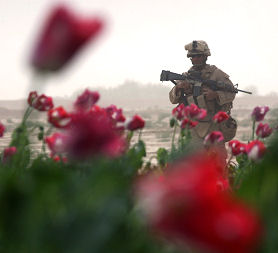Afghan opium cultivation 'plummets'
Updated on 02 September 2009
Afghanistan's opium cultivation, which accounts for 90 per cent of the world's heroin, drops by a third in Helmand province according to figures published today.

Could one element of military intervention in Afghanistan be going well? According to a UN report out today, opium production in the country has plummeted; a sign, perhaps, that efforts to encourage farmers to cultivate legitimate crops rather than drugs are going well.
The vast majority of the world's demand for heroin - and the opium that makes it - is satisfied by the poppy fields of Afghanistan.
The report by the United Nations Office on Drugs and Crime (UNODC), released in Kabul this morning, says that, at peak in 2007, 193,000 hectares of farmland were used for poppy cultivation. The report says that has now fallen by 23 per cent to 123,000 hectares.
This year in Helmand province, where most British soldiers are currently based, there were 69,833 hectares devoted to poppy growing - a sharp fall from 103,590 hectares in 2008.
Twenty of Afghan's provinces are now designated as “poppy free”, up from eighteen last year.
Overall production though is down just 10 per cent. That discrepancy is explained by more efficient production techniques; more opium produced per hectare cultivated.
And opium production in Afghanistan remains a major problem: the country still produces 6,900 tons annually - 1,900 tons more than total worldwide demand.
It has been, the UNODC says, a mixture a carrots and sticks that have achieved reductions.
In dedicated 'food zones' farmers have been offered incentives - free wheat seeds and tractors for example - to switch from opium and to legitimate crops. Those zones have seen the biggest reductions in poppy cultivation - 37 per cent down.
There's also been an increase in action taken against poppy farmers – £8m of opium seized and 259 convictions for opium-related offences by a counter-narcotic police force of 3,800 – although that is only half the number thought to be needed.
One major shift referred to in the report is a move away from attempts to simply eradicate opium: the head of the UNODC, Antonio Maria Costa, says "eradication continues to be a failure".
Over the past two years only 10,000 hectares of opium have been eradicated, less than 4 per cent of the total "at an enormous human and economic cost".
Tackling opium production is seen as a key way of undermining the Taliban which is thought to receive around $100m from the profits of opium production each year.





